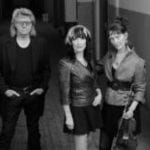Five Questions: Steel City Rovers’ Ryan McKenna
Ryan McKenna describes the music of his Steel City Rovers as a new stew made with an old recipe.
The Hamilton, Ontario-based ensemble – which features McKenna on vocals, accordion, whistles and washboard; his brother Joel McKenna on guitar; Dave Neigh on fiddle; journeyman Mark Fletcher on whistles, small pipes, mandola and more; and Jess Gold on drums and other percussion – echoes the traditions of Cape Breton fiddle styles and Appalachian swing filtered through a lens of original Celtic roots music.
Although the band has only been playing together since 2012, its untitled demo EP was nominated for Ethnic/World Recording of the Year at the 2013 Hamilton Music Awards. McKenna, who spoke by telephone from Hamilton, says the Rovers are currently working on their first full-length album and road-testing songs.
Q The first thing I found interesting about the Steel City Rovers is that you are largely a Celtic traditional band except you are playing new original music. Many Celtic and Irish bands don’t seem to deviate much from, well, traditional tunes, so how do you find that balance – between new and old – in the music?
A I think the exciting thing about this outfit is that it’s all original music. There’s a lot of writing, both instrumental and lyrical pieces. There’s a whole lot of instruments that get thrown into the mix as well. Some traditional things like Scottish small pipes and mandola, which is a bigger mandolin, some whistles, accordions. It’s really rich in texture.
With traditional music there can be a temptation to imitate what has gone on in prior generations. So people are imitating certain styles, certain inflections, even certain players from the past in an effort to reclaim some of what was going on. … We have all these things we enjoy from the past. We identify with the kind of rhythm and natural, acoustic tones of the tradition, but we’re also alive now in 2014 and playing this music now. So for us the music is a context and a setting for us to do new and creative and current things.
Q That also comes out in your live shows, which is unusual for a band that’s been together for such a short time. Can you talk about the certain ease the comes across when you’re together on stage?
A We’re very comfortable with our instruments; we’re very comfortable with each other. We get along so well as people that when we interact on stage we’re inviting everybody else to be part of the same space. I think sometimes there can be an artificial divide between people on stage and the audience that’s only bridged by call and response invitations or some storytelling, but we really interact with people and try to share the music unpretentiously. It feels very loose and we’re having a lot of fun with it.
Q The band is formed around you and your brother, Joel. So what was it growing up in the McKenna house that led you both into a career in music?
A Our parents were very religious and used to play a lot of music with the church. We were really steeped in that as kids. Mom was always singing in the kitchen. Dad had a traveling duo that went around a little bit. Music was a steady part of our lives. We would go to these house parties where we would just stay up into the wee hours singing songs. That evolved into Joel and I as teenagers trying to do something more serious together. We quit school because we were sure to be rich and famous and take on the world (laughing) … and we found a home in Celtic music. There’s a sensibility and an ethos to it, and it fit well with how we were built because we were taught that music was always valuable and important and spoke about things that mattered.
Q What is it that bridges the religious music of your upbringing with Celtic music to play today?
A I think Celtic music has a sense of the spiritual to it – not necessarily religious, but the mystical. It’s also very grounded in the real world almost in the same way as say country music. Classically, as a caricature, country music has “I lost my truck and my dog and my wife left me,” but similarly in the Irish (tradition) it’s “I couldn’t get to work, I’m broke and I’m having a beer.” It’s all very similar in that way.
Q What did it mean for you and the band to have your demo EP recognized at the Hamilton Music Awards, and when can we expect to hear that first full-length Steel City Rovers album?
A To be appreciated and recognized in the community in which we live is just extra encouragement. The name Steel City Rovers comes from Hamilton, Ontario, because I love where I’m from. There’s always this sense of possibility in Hamilton, and that speaks to our whole life. As we’re moving forward, we’re certainly going to be doing more recording. We want to tell the story of us through more music. It’s a huge priority. There’s a couple of new songs on the website now and we’re hoping to have that first full-length recording out certainly within the year so it can live beyond just our live shows. I mean, that’s why we do this. We want the music to be part of people’s lives.




